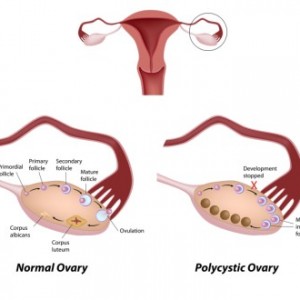
PCOS is caused by High Androgens – Except When it’s Not
PCOS, or polycystic ovarian syndrome, is a collection of symptoms that affects 8-10% of women of reproductive age. A syndrome is a collection of symptoms, some or all of which may be present. It can present at different times of a woman’s life, meaning things may have all seemed normal at some point, but later periods may become irregular and hormone imbalance symptoms may appear.
What Causes PCOS?
There is a common erroneous assumption that if a woman presents with symptoms related to PCOS (acne, oily skin/hair, irregular periods, excessive facial or body hair, infertility), she must have high levels of androgens. This assumption wrongly pigeonholes 40% of women with PCOS symptoms into the category of insulin resistance and high androgen levels. 60% of women with PCOS symptoms do have insulin resistance and elevated levels of DHEAs and/or testosterone. However, the remaining 40% do not. In these women, PCOS symptoms have a different root cause that needs to be investigated.
Two Examples of Alternative Causes of PCOS Symptoms
- Hyperprolactinemia (high blood prolactin levels) – Prolactin is a hormone produced by the pituitary gland that stimulates breast milk production for breastfeeding. However, prolactin levels can also be elevated due to stress and/or due to a benign pituitary tumour called prolactinoma. Prolactin interferes with normal ovulation, and PCOS-like symptoms arise due to the changes in the normal production of the female hormones estradiol and progesterone.
- Hypothyroidism – An underactive thyroid slows the function and metabolism of all of the body’s cells, including the cells in the ovaries that should be maturing egg follicles into eggs. Irregular ovulation occurs, leading to lower levels of estradiol and progesterone.
How to Know What Causes PCOS
The only way to accurately determine whether you have PCOS and why is to perform a complete battery of tests (as appropriate to you and determined by your doctor or naturopath). Appropriate tests for PCOS may include:
- Fasting blood sugar and insulin
- DHEAs
- Testosterone – total and free
- LH, FSH, and Estradiol (if cycles are present, preferably day 3 of the menstrual cycle)
- Progesterone (if cycles are present, preferably 7 days post expected ovulation)
- TSH (I prefer a full thyroid screen including fT3, fT4, anti-TPO and anti-thyroglobulin antibodies)
- Prolactin (I prefer to see more than one, as the level is variable day to day)
- HbA1c
- Lipid Profile
- Vitamin D
- Pelvic and Transvaginal ultrasound
- AMH (Anti-Mullerian Hormone)
How to Get Tested for PCOS
I can and often do run all of the above blood tests, particularly if women are having difficulty getting tests through their medical doctor. OHIP does not cover the cost of tests I order, so if possible, we try to get cooperation from your GP. I can’t order a pelvic and transvaginal ultrasound.
Testing is the best way to determine what causes PCOS for you so we can properly treat it.
Need Help Managing PCOS?
There are two options:
- If you are in or can be in the province of Ontario, Canada, I can see you in person or by video call and provide personalized care.
- If you are outside Ontario and can’t come here, you can get more generalized advice from my PCOS ebook: Balanced and Strong
Authored by Naturopath Dr. Pamela Frank, BSc(Hons), ND
Dr. Pamela has practiced as a naturopathic doctor in Toronto since 1999. She has received numerous “Best Naturopath in Toronto” awards. She is registered with the College of Naturopaths of Ontario.
Dr. Pamela Frank uses a natural treatment approach that may include acupuncture, herbal medicine, nutrition, diet, vitamins, supplements, and other natural remedies to restore balance and provide long-term resolution to almost any health problem.
Research:
Iptisam Ipek Muderris,a Abdullah Boztosun,b Gokalp Oner,a and Fahri Bayramc Effect of thyroid hormone replacement therapy on ovarian volume and androgen hormones in patients with untreated primary hypothyroidism. Ann Saudi Med. 2011 Mar-Apr; 31(2): 145–151.
Islam S, Pathan F, Ahmed T. Clinical and Biochemical Characteristics of Polycystic Ovarian Syndrome among Women in Bangladesh. Mymensingh Med J. 2015 Apr;24(2):310-8.


